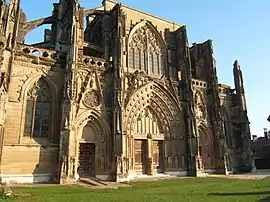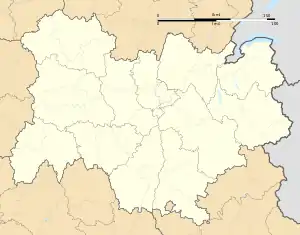Saint Antoine l'Abbaye
Saint Antoine l'Abbaye (French pronunciation: [sɛ̃.t‿ɑ̃twan labei]), also Saint-Antoine-en-Viennois, is a commune in the Isère department in southeastern France.[3] On 31 December 2015, the former commune of Dionay was merged into Saint Antoine l'Abbaye.[4]
Saint Antoine l'Abbaye | |
|---|---|
 Abbey church | |
 Coat of arms | |
Location of Saint Antoine l'Abbaye | |
 Saint Antoine l'Abbaye  Saint Antoine l'Abbaye | |
| Coordinates: 45°10′33″N 5°13′02″E | |
| Country | France |
| Region | Auvergne-Rhône-Alpes |
| Department | Isère |
| Arrondissement | Grenoble |
| Canton | Le Sud Grésivaudan |
| Government | |
| • Mayor (2022–2026) | Maryline Longis[1] |
| Area 1 | 36.22 km2 (13.98 sq mi) |
| Population | 1,197 |
| • Density | 33/km2 (86/sq mi) |
| Time zone | UTC+01:00 (CET) |
| • Summer (DST) | UTC+02:00 (CEST) |
| INSEE/Postal code | 38359 /38160 |
| Elevation | 274–578 m (899–1,896 ft) (avg. 365 m or 1,198 ft) |
| 1 French Land Register data, which excludes lakes, ponds, glaciers > 1 km2 (0.386 sq mi or 247 acres) and river estuaries. | |


Formerly known as La-Motte-Saint-Didier, it was renamed after becoming the home of purported relics of Saint Anthony the Great in the 11th century, and shortly afterwards of the original house of the Hospital Brothers of St. Anthony, founded here in 1095 as the result of miraculous cures from St. Anthony's Fire ascribed to the relics.
It was set up as a Benedictine community, whose monks cared for the shrine and the relics, while the Brothers cared for those suffering from the then common malady of St. Anthony's Fire. Over the course of the next two centuries, disputes between the Antonines and the Benedictines arose repeatedly. The Antonines were formed into an Order of canons regular in 1297. At that time the Benedictine monks were removed from the shrine, which was entrusted to the Antonines. In 1890 the Canons Regular of the Immaculate Conception were given the Abbey of St. Antony, which was the motherhouse of the congregation and it maintained that role from 1890 until 1903, when, following the anti-clerical laws passed by the French government in 1901, the community was transferred to Andora, in the Italian region of Liguria.
Monuments
The village is since 2009 one of the most beautiful villages of France, and hosts many monuments, the most important of which are the abbey church and the abbey.
Population
|
|
Mayors
| From | Until | Name |
|---|---|---|
| 1816 | November 1830 | André Ferdinand Génissieu |
| November 1830 | Pierre Désiré Vivier | |
| around 1831 | Jean Pierre Baudoin | |
| 1837 | 1846 | Joseph Mathieu Sorrel (1797-1847) |
| around 1847 | Gustave Henry Aimé Jacques Guyon (1810-1859) | |
| around 1849 | Candide Hypolite Glandert (1797-1860) | |
| 1852 | August 1860 | Jean Baptiste Joachim Giraud (1816-1872) |
| August 1860 | April 1867 | Armand Génissieu |
| June 1867 | September 1870 | Jean Baptiste Joachim Giraud (1816-1872) |
| September 1870 | January 1878 | Jules Vignal |
| February 1878 | June 1879 | Ferdinand Lassara (1811-1888) |
| June 1879 | November 1885 | Maurice Cyrille Ginier (1825-1885) |
| January 1886 | May 1896 | Eugène Benjamin Germain (1849-1900) |
| May 1896 | March 1900 | Hippolyte Chaloin (1835-1900) |
| June 1900 | May 1908 | Pierre Fleury Roux (1846-1913) |
| May 1908 | January 1923 | Aimé Dupeley |
| 1935 | December 1943[5] | Ferdinand Xavier Gilibert (1887-1945) |
| March 2001 | André Suisse | |
| March 2001 | December 2015 | Marie-Chantal Jolland |
| For the new commune, which is a distinct administrative entity: | ||
| From | Until | Name |
| January 2016 | on going | Marie-Chantal Jolland |
See also
References
- "Répertoire national des élus: les maires" (in French). data.gouv.fr, Plateforme ouverte des données publiques françaises. 4 May 2022.
- "Populations légales 2020". The National Institute of Statistics and Economic Studies. 29 December 2022.
- INSEE commune file
- Arrêté préfectoral 30 September 2015
- He was arrested by the Gestapo on December 19th, 1943, and then sent to a concentration camp in Germany.